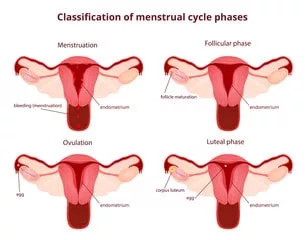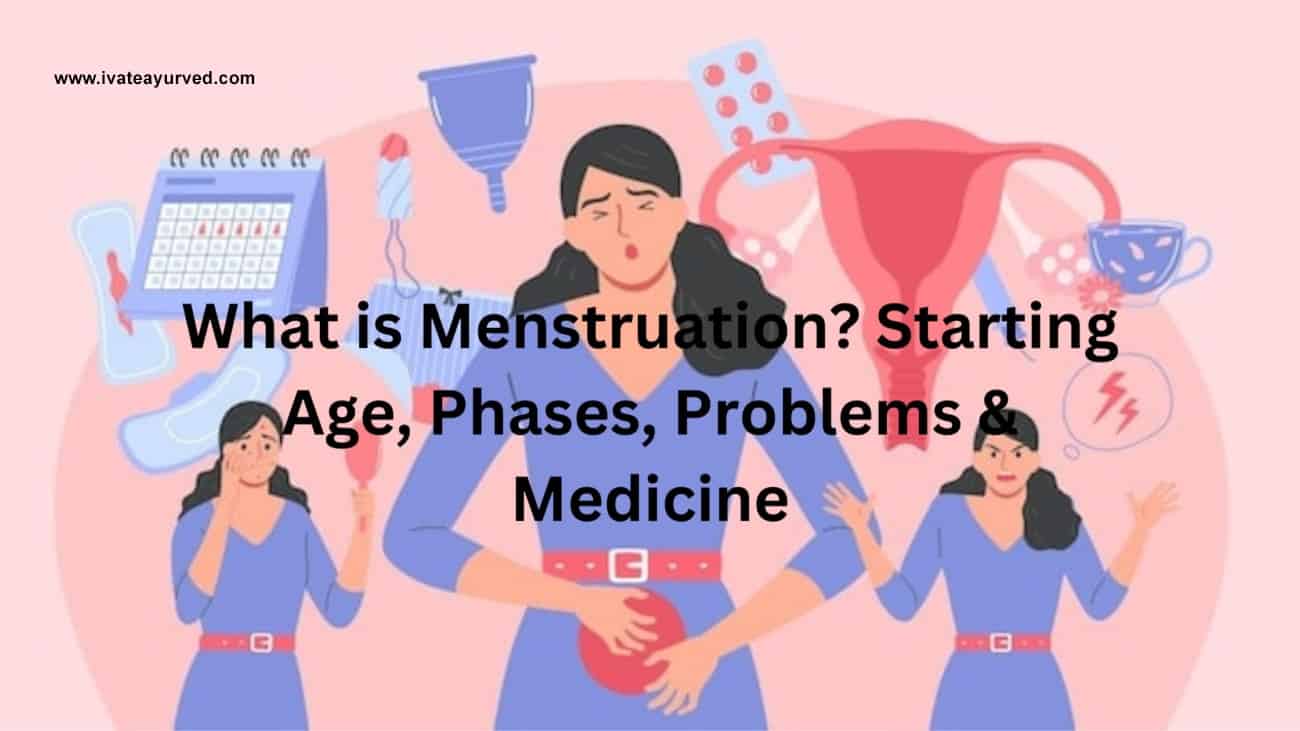What is Menstruation? Starting Age, Phases, Problems & Medicine
What is Menstruation?
Menstruation is the regular discharge of blood and other material from the lining of the uterus in female reproductive-aged individuals. It occurs as part of the menstrual cycle, which is the physiological process that prepares a woman’s body for pregnancy. On average, a menstrual cycle lasts 28 days, but this can vary from woman to woman. During the cycle, the uterus builds up a lining of blood and tissue in preparation for a potential pregnancy. If pregnancy does not occur, the lining is shed, leading to menstruation. Menstruation typically lasts 2-7 days and can cause physical and emotional symptoms, such as cramping, bloating, fatigue, and mood swings.
What is the Menstrual Cycle?
The menstrual cycle is the natural physiological process that occurs in women of reproductive age to prepare the body for pregnancy. It typically occurs approximately every 28 days and is characterized by a series of hormonal changes and physiological events that occur in the female reproductive system.
The menstrual cycle is divided into three phases: the menstrual phase, the follicular phase, and the luteal phase. During the menstrual phase, the uterus sheds its lining, leading to menstrual bleeding. This marks the beginning of the cycle and typically lasts 2-7 days. The follicular phase is when the ovaries release an egg (ovulation) and last from day 1 to day 14 of the cycle. The luteal phase occurs after ovulation and lasts from day 14 to day 28, during which the body prepares for pregnancy if conception occurs.
Hormones, such as estrogen and progesterone, play a crucial role in regulating the menstrual cycle and preparing the body for pregnancy. Menstrual cycle irregularities, such as heavy bleeding, prolonged cycles, or missed periods, can indicate underlying health problems and should be evaluated by a doctor.
Understanding the menstrual cycle and its physiological processes can help women manage their monthly changes and any related symptoms, such as cramping and bloating. Regular monitoring of the menstrual cycle can also provide important information about overall reproductive and menstrual health.
At what age does Menstruation typically begin?
Menstruation typically begins between the ages of 8 and 15 and is a sign that a girl has reached puberty and is becoming biologically capable of pregnancy. The exact age at which menstruation begins can vary and is influenced by several factors, such as genetics, diet, and overall health. On average, most girls will begin menstruating between the ages of 11 and 14, but some may start as early as age 8 or as late as age 16.
It’s important for girls and their parents to be prepared for the onset of menstruation, as it can be an emotional and physical adjustment. It’s a good idea to discuss menstrual health and hygiene, as well as options for menstrual products, with a doctor or a trusted adult. Understanding the menstrual cycle and its associated changes can help girls and women manage their monthly changes and maintain their overall reproductive and menstrual health.

What are the Phases of the menstrual cycle?
The menstrual cycle is divided into three phases:
- Menstrual Phase: This phase starts on the first day of menstruation and typically lasts 2-7 days. During this time, the uterus sheds its lining, leading to menstrual bleeding.
- Follicular Phase: This phase occurs after the menstrual phase and lasts from day 1 to day 14 of the cycle. During this time, the ovaries release a mature egg (ovulation) and the hormone estrogen dominates, causing the uterus to thicken its lining in preparation for pregnancy.
- Luteal Phase: This phase starts after ovulation and lasts from day 14 to day 28 of the cycle. During this time, the hormone progesterone dominates, causing the uterus to maintain its thickened lining in preparation for pregnancy. If pregnancy does not occur, the lining is shed, leading to the start of the next menstrual phase.
Hormonal changes play a crucial role in regulating the menstrual cycle and controlling the different physiological processes that occur during each phase. The length and frequency of the menstrual cycle can vary from woman to woman and can be influenced by factors such as stress, illness, and changes in weight or physical activity.
What Problems Occurs while Menstruation?
There are several common Menstrual problems that can occur during a woman’s menstrual cycle, including:
- Heavy bleeding: This is characterized by excessive blood loss during menstruation and can lead to anemia, fatigue, and discomfort.
- Painful periods (dysmenorrhea): This is characterized by cramping and pain in the lower abdomen during menstruation.
- Irregular periods: This is characterized by unpredictable and inconsistent cycle lengths and can indicate underlying health problems.
- Pre-menstrual syndrome (PMS): This is a group of symptoms, such as bloating, cramping, mood swings, and fatigue, that occur in the days leading up to menstruation.
- Premenstrual dysphoric disorder (PMDD): This is a severe form of PMS that can cause significant distress and impact daily activities.
- Endometriosis: This is a condition in which the tissue that normally lines the uterus grows outside of it, causing pain and discomfort.
- Polycystic ovary syndrome (PCOS): This is a hormonal disorder that can cause irregular periods, cysts on the ovaries, and other symptoms.
- Menorrhagia: This is characterized by prolonged or heavy menstrual bleeding and can lead to anemia and other health problems.
If you experience any of these symptoms, it’s important to consult a doctor for a proper evaluation and treatment. Early diagnosis and treatment can help manage menstrual problems and maintain overall reproductive and menstrual health.
When to see your doctor while Menstruation?
There are several situations when it’s important to see a doctor during your menstrual cycle, including:
- Irregular periods: If you experience inconsistent cycle lengths, skipped periods, or very heavy bleeding, it’s important to seek medical attention to determine the underlying cause.
- Painful periods (dysmenorrhea): If menstrual cramping or pain is affecting your daily activities, it’s important to see a doctor to rule out underlying medical conditions and find effective treatment.
- Heavy bleeding: If you experience excessive blood loss during menstruation and are concerned about anemia or other health problems, it’s important to see a doctor for a proper evaluation.
- Menstrual cycle changes: If you experience sudden changes in your menstrual cycle, such as a sudden onset of heavy bleeding or irregular cycles, it’s important to seek medical attention to determine the underlying cause.
- Premenstrual symptoms: If you experience severe premenstrual symptoms, such as PMDD, that are impacting your daily life, it’s important to see a doctor for a proper evaluation and treatment.
- Reproductive health issues: If you have concerns about your reproductive health, such as endometriosis, PCOS, or other menstrual-related conditions, it’s important to see a doctor for a proper evaluation and treatment.
- Fertility issues: If you are trying to conceive and are having difficulty, it’s important to see a doctor to evaluate your menstrual cycle and overall reproductive health.
Regular check-ups with a doctor and monitoring of your menstrual cycle can help you maintain your reproductive and menstrual health and address any problems as they arise.
iVate Ayurveda Lady Care Capsules
iVate Ayurveda Lady Care Capsules can be used to support the Female body. The capsules are a combination of vitamins and minerals that support the female body. Capsules can be used to regulate the Menstrual Cycle and reduce stress. The capsules may also help reduce symptoms such as PMS and menopause.



Can We Eat During Periods Or Menstrual Cycle? Myth & Benefits
It provides relief from cramps and menstruation
May 11, 2023 at 5:03 pm
Why is Periods or Menstruation important for Females?
[…] Periods or Menstruation is important for a female as it signals that her reproductive system is working properly and that she is capable of pregnancy. It is a monthly cycle during which the uterus sheds its lining and prepares for a possible pregnancy. A lack of menstruation can indicate a health problem that should be addressed. Additionally, regular menstrual cycles can also help women track their overall health and fertility. […]
September 29, 2023 at 3:44 pm